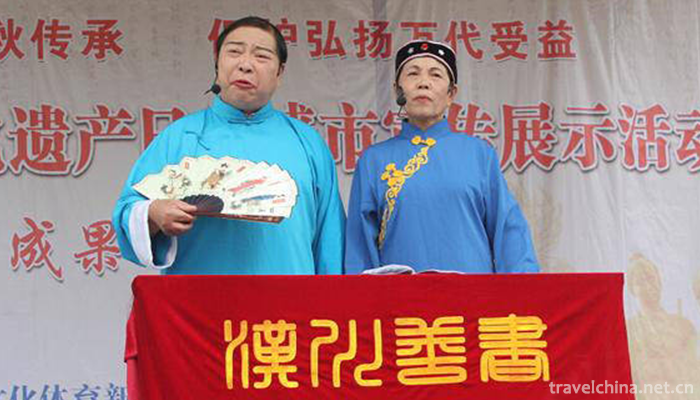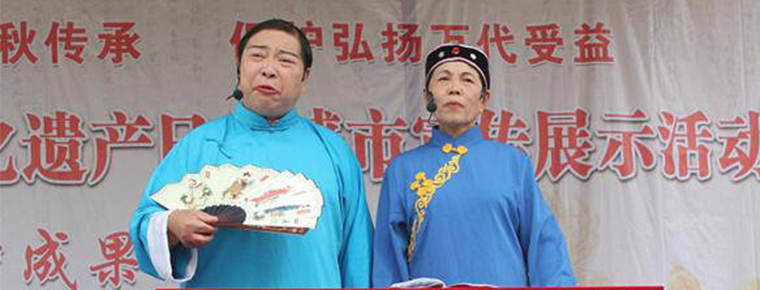Hanchuan good books
Hanchuan good books
Hanchuan Shanshu is a kind of traditional folk music which combines rap and singing in Hubei Province. Since the Qianlong period of the Qing Dynasty, it has a history of 260 years. It has been prevalent in Hubei Province, Kaifeng Henan Province, Leshan Sichuan Province and most of Hunan Province. So far, only the good calligraphers in Hanchuan City of Hubei Province have inherited and developed this kind of music. It is commonly known as preaching good books. Because artists often use "not to speak, tears full face" to start, so folk jokes call it "not to speak".
He Zouhuan, a well-known performance artist and national first-class actor, also believes that the local tone of Hanchuan Shanshu, which integrates the idea of persuading people to be good, has a strong epochal significance and needs to be further inherited and promoted.
On May 20, 2006, the opera was approved by the State Council and listed in the first batch of national intangible cultural heritage list.
Historical evolution
Good books are an important part of traditional folk literature. According to the analysis of the "storytelling figurines" unearthed from the ancient tomb of Tianrizhen, Sichuan Province, they sprouted in the Han Dynasty, and appeared in the Tang Dynasty with the same rhyme, parallel prose and "vulgar speaking" with both rap and singing. Since the Song and Yuan Dynasties, the types of rap and singing literature have been expanding day by day. In Yongle period of Ming Dynasty, there were "Qin Song Goodness Books" printed all over the world. In the Qing Dynasty, good books developed from desk literature to singing literature, and produced good calligraphy and folk art, which was popular in the eight banners of Zhili provinces, then declined in the north and flourished in the south. Besides Wuhan, Xiaogan, Jingzhou and Huanggang in Hubei, there were also artists engaged in such activities in Shanghai, Chongqing, Henan Kaifeng, Sichuan Wanxian, Hunan and Tianjin. After the founding of New China, the good books in the South gradually disappeared. Only the artists in Hanchuan, Caidian and Xiantao of Hubei inherited and developed this kind of music, and gradually formed the "good books in Hanchuan" centered on Hanchuan.
The reason why good books take root, blossom and bear fruit in Hanchuan is that in history Hanchuan was the convergence area of many rivers. From the Qing Dynasty to the Republic of China, nine subsidies were opened on both sides of the Xianghe River and returned to Hanshui. Water towns gradually became plains, and people gradually changed from fishing to farming. Life became more stable, and the demands for culture and education became increasingly urgent. During the Daoguang period, the official propaganda of the oracle was gradually replaced by the folk propaganda of filial piety to parents, harmonious families, friendly neighborhoods, rescue and emergency. At first, it was only preached around the Lantern Festival and the Chinese New Year Festival, and then gradually developed into regular activities. It could be preached in fields, streets and lanes, tea houses and restaurants, and was welcomed by villagers. Around 1936, from the countryside to Wuhan and other towns.
As a narrative style, Shanshu is not required to make up as dramas do, and its form is simple and easy to inherit, so Shanshu was quickly accepted, and developed into a kind of folk music in Hanchuan.
Inheritance status
It is mainly prevalent in Hanchuan, Hanyang and other counties in central Hubei, and in Wuchang and Hankou towns, of which Hanchuan County is the most prevalent. During the Anti-Japanese War, Hanchuan artists introduced it to Chongqing and Wanxian, Sichuan. Good books originated from the "propaganda oracle" in Shunzhi period of Qing Dynasty. The "propaganda of the oracle" is the story of propagating feudal ethics. In Guangxu's reign, "preaching the oracle" was replaced by "Ten Great Goods". It specifically put forward ten good deeds, such as filial piety to parents, harmony in the countryside, setting up righteousness, setting up a righteous ferry, offering tea and sympathizing with lonely and poor people. The map of Hubei advocated honesty and kindness, diligence and frugality, and opposed the evil of rapists and natural harm.
"Hanchuan Shanshu" has more than 300 excellent articles, and more than 100 articles are often preached. More than 300 people specialize in the creation of "Hanchuan Shanshu".
In the new century, influenced by the impact of foreign cultures and the rise of multi-cultures, as well as the death of some accomplished artists, few young people can make their own distinctions, and some excellent songs are on the verge of being lost. Hanchuan Shanshu encounters unprecedented difficulties in the current inheritance and development. Young artists are out of file, and the loss of tradition is serious, which urgently needs support and protection.
The state attaches great importance to the protection of intangible cultural heritage. On May 20, 2006, the opera was approved by the State Council and listed in the first batch of national intangible cultural heritage list.
Inheritance significance
Good book is a kind of folk music that combines rap and singing. Since the Qianlong period of the Qing Dynasty, it has a history of 260 years. It has been prevalent in Hubei, Henan, Sichuan and Hunan. Only the good calligraphers in Hanchuan inherited and developed this kind of music. The aria has a strong Jianghan Plain characteristics, and there are 13 remaining music cards. "Hanchuan Shanshu" has attracted wide attention from scholars at home and abroad.


-
1.Youyang Peach Blossom Source Tourist Scenic Area
Taohuayuan Scenic Spot is located in the suburbs of Youyang County, which is known as the "Liangdu of Chongqing". It is a national AAAAA-level tourist attraction
Time 2018-12-12 -
2.Beijing Wildlife Park
Beijing Daxing Wildlife Park is located in the 10,000 Mu forest of Yuyuan Town, Daxing District. It is a large natural ecological park with animal protection, wildlife domestication and breeding and p
Time 2018-12-26 -
3.Ancient town of Tangqi
Tangqi Town, located in the northern part of Hangzhou City, borders Deqing County of Huzhou City, is about 20 kilometers away from the city centre and 13 kilometers away from Linping
Time 2019-02-13 -
4.Swan Lake National Urban Wetland Park
Swan Lake National Urban Wetland Park, located in the ecological zone between the East and West urban areas of Sanmenxia City, covers an area of 8 850 mu, including 6 150 mu of land
Time 2019-02-21 -
5.Yumen Pass Yumenguan
Yumenguan was named after Emperor Wudi of Han Dynasty when he opened the Western Regions Road and set up four counties in Hexi. The Han Dynasty was a gateway to all parts of the Western Regions.
Time 2019-03-06 -
6.Zhuquan Village Tourist Resort
Zhuquan Village Resort is located in the north of Yinan County, Shandong Province, 12 kilometers away from the county. It was called Quanshangzhuang in Yuan and Ming Dynasties and was renamed Zhuquan
Time 2019-03-21 -
7.Lingqiu Luoluo Tune
Lingqiu Luoluo Opera evolved from Yiyang Opera and flourished during Qianlong Period of Qing Dynasty. From the end of Qing Dynasty to the Republic of China, it gradually declined. Luoluo tune is sung
Time 2019-05-13 -
8.Miaos Rock planting Custom
Traditionally, the Miao people have a kind of public deliberation and legislative activities called "burying rock" (also known as "planting rock". When burying rock, they bury a re
Time 2019-06-05 -
9.Poop love song
In February 2006, a cultural census unexpectedly found "Poya Ge Shu" in Poya Village. Through expert research, 81 patterns in "Poya Ge Shu" have the character of words, and are one
Time 2019-06-09 -
10.Lisu Folk Songs
Lisu people advocate singing in tune. In the multi-voice unaccompanied chorus of Lisu people, the three major tunes of Lisu folk songs are "swing time", "excellent leaf" and "
Time 2019-06-17 -
11.Evolution of Chengdu Giant Panda Base
Chengdu Giant Panda Breeding Research Base is established on the basis of raising, treating and breeding giant pandas in Chengdu Zoo. In the 1980s, Fargesia FRIGIDA in Qionglai mountains blossomed and died. Some giant pandas were rescued and concentrated in Chengdu Zoo for lack of food and hunger.
Time 2020-12-13 -
12.Neijiangs first industry
In 2019, the sown area of grain crops in Neijiang is 309600 ha, an increase of 0.3% over the previous year; the sown area of oil crops is 79900 ha, an increase of 0.4%; and the sown area of vegetables is 78100 ha, an increase of 2.3%. The total grain output
Time 2020-12-16